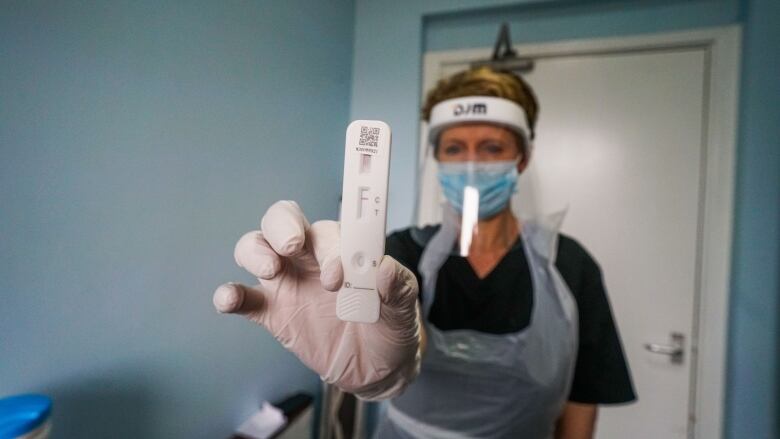Could quick COVID 'antigen' tests break the back of the pandemic?
A new study suggests frequent rapid antigen testing could control the spread of the virus within weeks


A new study suggests the best way to curb the spread of COVID-19 quickly, during the wait for vaccines, is to make inexpensive, rapid, self-administered 'antigen' tests widely available so people can test themselves frequently.
"That should give enough people immediate knowledge of their status if they are unknowingly carrying the virus, potentially spreading it to others, so … the amount of virus in the whole population would come crashing down," said Dr. Michael Mina, an epidemiologist from Harvard School of Public Health.
Antigen tests detect viral proteins rather than genetic material, which is what the current gold standard lab-based PCR tests test for. This means they tend to detect only infectious virus, rather than genetic material that can linger after an infection, said Mina.
The antigen tests can be simple to administer, requiring a nasal swab and a small container of testing material, and they can produce results in as little as fifteen minutes. The technology is very similar in operation to familiar home pregnancy tests.
The logic behind using these cheap tests frequently, according to Mina, is that most of the people currently getting tested for COVID-19 either suspect they've been exposed — through a contact who tests positive — or they have symptoms. But since many infected individuals are unaware of exposure, and experience no symptoms at all, they may be transmitting infection without even realizing it.
Home-based tests could allow people to test themselves routinely, so they can become quickly aware of any infection and isolate if positive.
The Canadian government has begun to distribute a version of an antigen test to to provinces and territories, but it still needs to be administered by a qualified healthcare practitioner.
Concerns around the accuracy of rapid antigen tests, compared to standard PCR tests, have meant that provinces and territories are either still assessing them or are only just beginning to roll them out in a limited way.
While there has been confusion around how to compare antigen test results with PCR results, Mina said the more we learn, the more scientists realize the antigen tests are effective and work "completely as expected."
Testing for an active infection
According to Mina, lab-based PCR tests are analogous to detectives who show up at a crime scene after a crime occurred to look for DNA that can identify a perpetrator.
"That's a lot like the PCR test. It can actually pick up RNA left in the nose after the infection has completed, and sometimes that RNA can persist for four weeks or even months," Mina told Quirks & Quarks host Bob McDonald.
"Whereas these antigen tests, by looking for the active infection, are more like a security guard instead of a detective. They are only concerned with what's happening now. Is there a crime being committed or a problem happening right now? And if so, then they flag it as positive."
He said recent studies have shown that high-quality antigen tests are more than 95 per cent effective at detecting infectious virus.
Frequent testing is key
To understand how rapid antigen tests could impact an ongoing outbreak, Mina and his colleagues used computer modelling to try out different testing scenarios using at-home versions of rapid antigen tests.
Mina and his colleagues incorporated details such as the viral load in an individual at different points in their infection, as well as the sensitivity of these tests, in their epidemiological models.
By adjusting variables like frequency of testing and how often new cases of COVID-19 were being introduced, Mina could test how an outbreak would play out over time.
If we're not doing frequent testing, then even the most sensitive tests in the world won't be able to stop transmission.- Dr. Michael Mina, Harvard School of Public Health
He said they found that if only half of the population tested themselves twice a week — and even if 10 per cent of the tests failed — at-home rapid antigen testing could work to control the spread of the virus within weeks.
Mina's study suggests the more access people have to rapid antigen tests, whether it's the at-home tests he modelled, or healthcare-professional administered tests currently in the hands of provincial and territorial health authorities, the more quickly the outbreaks would dissipate.
"If we're not doing frequent testing, then even the most sensitive tests in the world won't be able to stop transmission," added Mina.
Health Canada has yet to approve any at-home rapid antigen tests, so in the meantime, Mina said health authorities should do everything they can to reduce barriers to testing and use existing rapid antigen tests in places where case numbers are the worst or access to testing is the lowest.

Slovakia real world example
Mina said the best real world example of how rapid antigen testing could work is Slovakia, which until very recently was experiencing a severe outbreak.
The country tested about a half to two thirds of the population with rapid antigen tests once a week for a couple of weeks, "and very quickly, they saw … the amount of virus in the population dropped by about 50 per cent in just a week or two."
Given the heavy economic and mental toll the pandemic is having on people, Mina said countries like the United States and Canada could benefit strongly by deploying rapid antigen tests in communities where the virus is currently out of control.
Produced and written by Sonya Buyting.